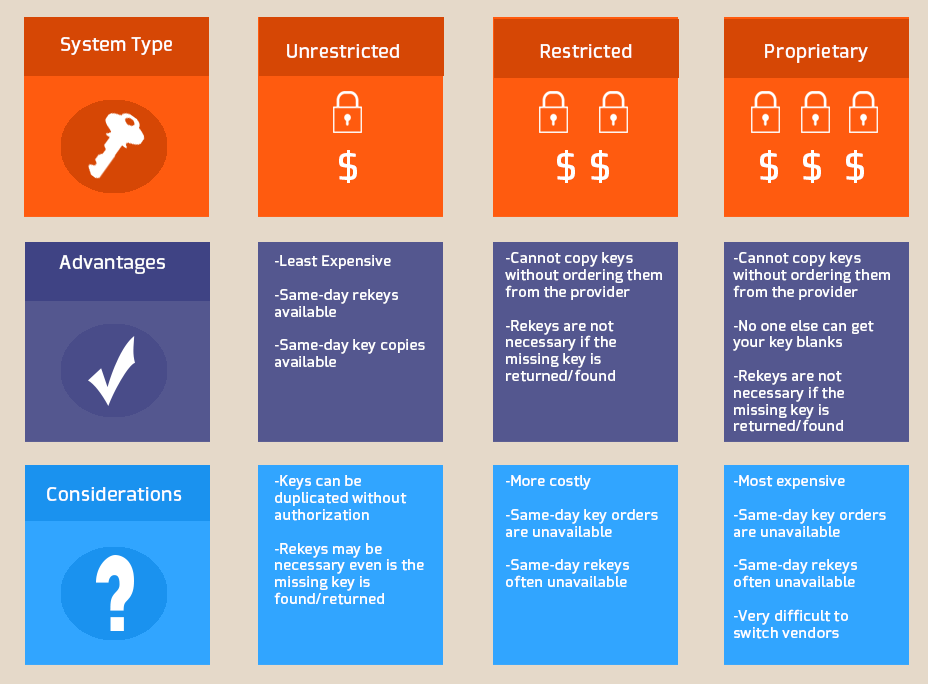Are you ready to travel further down our key system path? If you missed last week’s post, we discussed unrestricted keyways, and as promised we’re going to dive into proprietary and restricted keyways today. These two system types have a lot in common, but there are a few glaring differences. Let’s take a look.
Key System Types
Restricted Keyways
Restricted keyways offer a higher level of security because of the restrictions in making copies of keys. All key and core orders must be placed through an authorized dealer. As such, if an employee quits or is terminated, as long as the keys are returned there is no need to rekey the store. With the added level of security and personalization, restricted keyways do come with a higher price tag compared to unrestricted; however the level of security often outweighs the cost. Should you decide to select a restricted keyway, keep in mind that because of the added security, some conveniences are sacrificed. Due to the fact that your keys and cores must be ordered from a dealer as opposed to a local locksmith, same-day rekeys and same-day key copies are often unavailable. There are rekeyable systems that allow you to perform same-day rekeys; we’ll talk about those in the weeks to come.
Proprietary Keyways
With proprietary systems, the customer can be defined as the end-user or as the key system vendor. If the end-user owns the keyway, they can either purchase their keys directly from the manufacturer, or they can set up a distribution program with the manufacturer and a designated vendor. The vendor would be contractually obligated to restrict the key blanks specifically for that end customer. Conversely, if the vendor is the end-customer, the proprietary key system can be used for any of their customers. Key manufacturers closely track the sale of the keys; if a key is sold via an unauthorized channel, the manufacturers can, and usually will take legal recourse. Medeco is well known for tightly monitoring their proprietary systems. Proprietary systems are the most costly system type but also provide the highest level of security; you can rest comfortably knowing that absolutely no one else can get a copy of your key. Like restricted systems, you will sacrifice the convenience of same-day rekeys and key copies. Moreover, once you have committed to a vendor partner, it can be a lengthy process should you decide to terminate the relationship and transfer key records and blanks. If your system is proprietary to your vendor, be aware that should you leave, you will no longer be able to purchase keys or cores on that system. End-user proprietary systems are more popular than vendor systems to avoid that issue. These aren’t the only options that are available; there is an assortment of unique options that can be personalized to meet the exact needs of your facility. Stay tuned to the remainder of our Key System Series over the next few weeks and we’ll go into the details of each.
Have any questions? Let us know in the comments!
Check out our Key Systems 101 article for more information.
[maxbutton id=”1″]
Check out the rest of our series:
The Five Critical Components of Key System Management
Key System Types: Restricted, Unrestricted, and Proprietary
Proprietary & Restricted Key Systems
Standard Cylinders versus Interchangeable Cylinders – What’s the Difference?
eCylinders – The Amazing, The Mundane, and The Considerations
Rekeyable Cylinders – Fast, Easy, & Cost Effective
Master Key Systems – Controlled Access With One Key
Key System Policies – Keep Your System In Tact
Key System Procedures – A Roadmap for Maintaining Your System’s Integrity
Rekey Policies & Procedures – Three Elements to Consider
Key System Records Management – 4 Cornerstones


Where does the “Do Not Duplicate” stamp fit into these classifications? Is that really considered to be secure?
Hi Matt-
Keys with “Do Not Duplicate” stamped on them are typically going to be on unrestricted keyways. While this stamp is a deterrent, there are no legal ramifications for making key copies with this stamp; in fact, there are self-serve kiosks where you can copy unrestricted key blanks. We do not recommend relying on this stamp as a means of securing your key system. Check out our 7/30/13 post to learn more about unrestricted key systems.